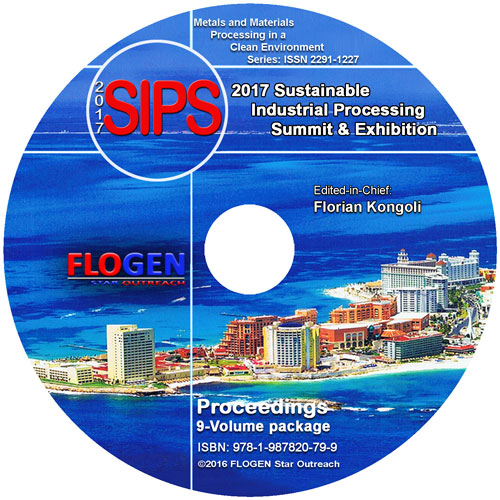2017-Sustainable Industrial Processing Summit
SIPS 2017 Volume 5. Marquis Intl. Symp. / New and Advanced Materials and Technologies
| Editors: | Kongoli F, Marquis F, Chikhradze N |
| Publisher: | Flogen Star OUTREACH |
| Publication Year: | 2017 |
| Pages: | 590 pages |
| ISBN: | 978-1-987820-69-0 |
| ISSN: | 2291-1227 (Metals and Materials Processing in a Clean Environment Series) |

CD shopping page
Biohydrogen Production from Wastes is Advanced Technology for Energy Economy
Armen Trchounian1;1YEREVAN STATE UNIVERSITY, Yerevan, Armenia;
Type of Paper: Regular
Id Paper: 220
Topic: 43
Abstract:
Hydrogen (H2) is effective, ecologically friendly, and renewable source of energy, and its production has great future potential for the energy economy. One of the methods is the production of H2 by bacteria (biohydrogen) performing dark- (Escherichia coli) and light-fermentation (Rhodobacter sphaeroides). Biohydrogen has advantages of high yield, low temperature, and cheap substrates.
To develop biotechnology, mixed cultures of E. coli and Rh. sphaeroides wild type strains were studied, and wet distillers grains as cheap substrate was used. Mixed cultures can produce H2 with 1.5-3 fold higher yield than pure cultures of each bacterial species. Moreover, H2 production can be observed in prolonged continuous culture (up to 96 h). The disproportion between rates of substrates uptake and fermentation of end products formation in the mixed culture can change pH; this might change activity of responsible enzymes, hydrogenases (Hyd) and formate hydrogen lyases consisted of Hyd 3 and Hyd 4 in E. coli and nitrogenases and Hyd in Rh. sphaeroides improving H2 production. The pre-treatment of distillers grains was required.
In addition, glycerol as a by-product of biodiesel production and brewery spent grains were also used for H2 production by E. coli. H2 yield could be significantly stimulated depending on pH, concentration of substrates and some mutants with defective Hyd.
These findings on biohydrogen production by bioconversion of organic wastes are of great interest for future energy economy. They would lead to spread up a strategy for sustainable and renewable energy production from available and cheap wastes.